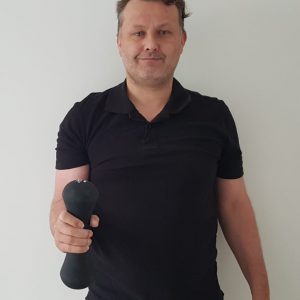Resistance training – the incorrect way
There are some common misconceptions about the biomechanics of exercise and what constitutes good exercise. Sometimes a convenient option may be chosen, or sometimes we do what we were taught. Sometimes that’s all wrong.
The exercise below is commonly prescribed to strengthen rotation. The misconception is that the patient is rotating the dumbbell, but they are really doing combinations of wrist flexion and wrist extension at different stages. The forces are not against rotation due to the balance of the dumbbell in the hand. As a result, this will not strengthen rotation.
This is not resistive rotation, the “patient” may be rotating, but the centre-of-gravity of the dumbbell is in the centre of the hand. Therefore each side of the dumbbell balances the other from any rotation and the net rotational forces are therefore zero.





The way to strengthen supinators and pronators is with something unbalanced, so the muscles have to force into either direction. A convenient way to do this is with a hammer, mallet, stick or broom. The hammer makes a convenient start, but as it only weighs 450g with a lever of 300mm (typical claw hammer), it will get a patient strong enough to turn an easy door handle, but not strong enough to open a jar. For a detailed look at a better way to strengthen rotation, please review our article on strengthening.
#consult your health professional for individual advice as to whether this exercise is right for you



